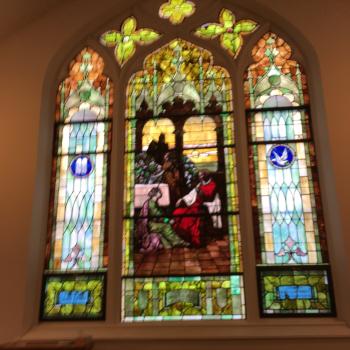For 40 days between Pentecost and their forthcoming convention, Mennonite Church USA is putting forth daily verses or passages of scripture “to seek God’s heart for immigrants”, which I have been receiving via email from the congregation in which I was baptized. While I appreciate this biblical theme in itself, one verse in particular reminded me why. That verse was Exodus 23:9.
You shall not oppress a resident alien; you know the heart of an alien, for you were aliens in the land of Egypt.
This reminder to the people of ancient Israel resonated personally with me as I realized, yes, I do “know the heart of an alien.” I have lived as an alien in three countries outside of the United States, and I have returned each time to find myself an alien in my country of origin. Knowing first-hand the value of having a few savvy “cultural brokers” to explain to me why things are done a certain way, and to explain to others that I’m not completely crazy when I make a mistake, I have found deep joy and rich friendships in the opportunities I’ve had to fulfill that role for others – and the benefit has been emphatically mutual. I am frequently drawn to expatriates, not only because of the immediate connection of the shared experience of foreignness, but also because their presence has so often come as a breath of fresh air when my world is becoming too small. Such people remind me, without having to say so explicitly, that the world (and no less the Church) is much bigger than America, or wherever one happens to be; and that we are all aliens and sojourners, and this is as it should be.
The Egyptian experience invoked here as the reason for identifying with resident aliens is a thread that runs deep throughout the Torah, and one that bears significant lessons for us today. A group’s historical memory can be a powerful thing. That’s why feeling foreign even in one’s homeland is second nature to Mennonites, most of whom would take this as a compliment. But it wasn’t so long ago, historically speaking, that Catholics were the mistrusted aliens in the United States. This experience ought to shape our outlook and behavior in the same way the Israelites’ experience in Egypt shaped the Mosaic law. What I find most striking about the latter is how an overwhelmingly negative historical memory is used as a pointedly positive example. This memory is constantly reiterated, not as an excuse to feel superior to those who had mistreated them in the past, but as a potent way of driving home the golden rule: remember what it was like to be foreign and marginalized, mistrusted and enslaved. Welcome the stranger among you as you would have wanted to be welcomed then.
The historical memory that underscores a sense of solidarity with the resident alien thus also underscores the command not to oppress them – or, more positively, to seek their well-being. Catholic social teaching has consistently applied this biblical mandate in its response to modern globalization, and our bishops continue to follow faithfully in this tradition. Earlier this month, Archbishop of Los Angeles José Gomez, chairman of the USCCB’s Committee on Migration and himself a naturalized citizen, issued this official statement on the congressional debates now taking place on immigration reform.
The Catholic Church in America has an important stake in the outcome of this debate because we are an immigrant church, and have grown with the country for over two hundred years. Each day in our parishes, social service programs, hospitals, and schools we witness the human consequences of a broken immigration system. Families are separated, migrant workers are exploited, and our fellow human beings die in the desert. Without positive change to our immigration laws, we cannot help our brothers and sisters. Simply put, the status quo is morally unacceptable. This suffering must end.
Our nation has a stark choice. We can continue on our current path, which employs an immigration system that does not serve the rule of law or the cause of human rights, or we can create a system which honors both principles. We can maintain a system that fosters illegal behavior and undermines the law, or fashion one that provides incentives for legal behavior and is based upon fairness and opportunity.
Our nation must answer several questions.
Do we want a country with a permanent underclass, without the same rights as the majority?
Do we want to continue to separate children from parents, creating a generation of young U.S. citizens who are suspicious and fearful of their government?
Do we want a nation that accepts the toil and taxes of undocumented workers without offering them the protection of the law?
The answer to these questions, of course, is a resounding no.
I encourage our elected officials to move forward and debate immigration reform in a civil and respectful way. The U.S. Catholic bishops are committed to working with them to enact humane immigration reform legislation as soon as possible. In the end, the outcome of this debate will not only affect our nation’s future—it will impact our soul.
This commitment on the part of the bishops is only natural, and the rest of us are called to follow their lead. Because as long as the Church is truly catholic, she will always know the heart of an alien.












